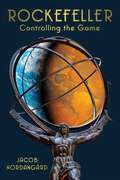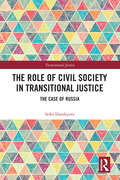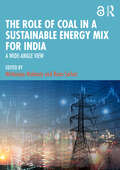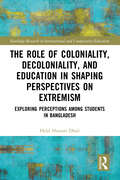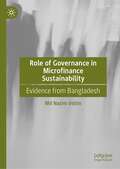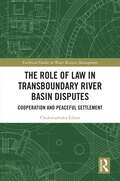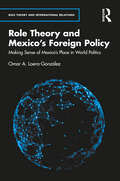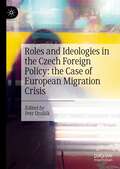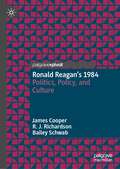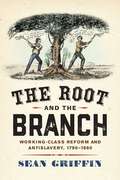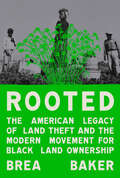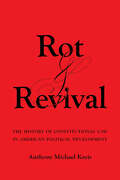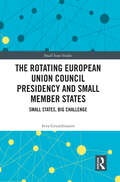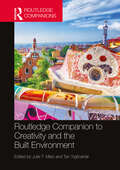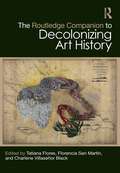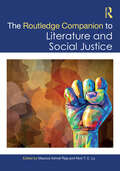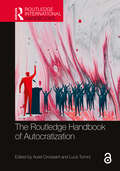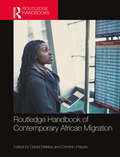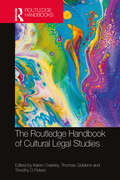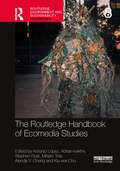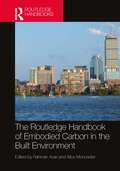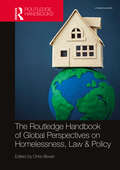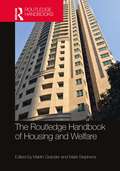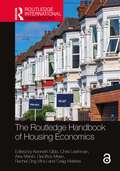- Table View
- List View
Rockefeller: Controlling the Game
by Jacob NordangårdWhy would the first family of oil so ardently support environmental climate research and activism? Join author and researcher Jacob Nordangård as he uncovers the whole sordid truth. The Rockefeller family is one of the richest in the world. Yet, why would the family that made the world dependent on oil fund environmental and climate research since the 1950s, help shape climate policy measures since the 1980s, and supported climate activism since the 1990s? Rockefeller: Controlling the Game is the thrilling and paradoxical story of one of the world's most influential global players. Through its top position in American business, close contacts with the White House, and with their immense financial power as one of the world's leading private research funders, the Rockefellers have been able to anchor the climate issue both scientifically and politically. Yet what is the reasoning behind doing so? Author and researcher Jacob Nordangård follows the family from the founding of Standard Oil and the Rockefeller Foundation, up through the aftermath of the Paris Agreement, with the declaration of the Fourth Industrial Revolution in January 2016, to the present day. Nordangård's in-depth research includes the large quantities of new material recently made available on the Internet, as well as the Rockefeller Foundation's own annual reports. Nordangård's main focus is the Rockefeller family's involvement in climate research and politics, but the actions and motives of some of their allies are also explored, as well as the family's influence on the development of modern medicine, family planning, agriculture, art, architecture, behavioral science, information technology, and politics. The Rockefeller family's utopian dream of a perfect world will have serious consequences for the survival of the human species and life as we know it. The Rockefeller Foundation's stated mission to "promote the well-being of humanity throughout the world" has a dark flipside, as, Nordangård will prove, the Rockefeller family's long-standing battle against climate change contains elements of sophisticated propaganda techniques, futurism, and New Age philosophy, aiming at a complete transformation of the whole earth system, including economy, ecology, culture, and even humanity itself.
The Role of Civil Society in Transitional Justice: The Case of Russia
by Selbi DurdiyevaThis book examines how civil society engages with transitional justice in Russia, demonstrating a broad range of roles civil society can undertake while operating in a restrictive political context. Based on sociolegal research, the study focuses on three types of civil society groups dealing with the legacies of the Soviet repression in Russia – a prominent organisation that works on recovering historical truth, the International Memorial; a parish of the Orthodox Church of Russia operating at a former mass execution and mass burial site, the Church at Butovo; and contentious groups that could hinder attempts at reckoning and promote state narratives built on the Stalinist and WWII victory myths. This book explores an often-overlooked case of Russia’s transitional justice ‘from below.’ It provides insights into how even in authoritarian contexts, civil society can adopt imaginative, piecemeal, and at times unconventional ways of seeking justice outside and in the absence of official and institutionalised transitional justice measures. This book will appeal to scholars of transitional justice, memory studies, human rights, and democratic and civil society theory, as well as policymakers and practitioners in these fields, and others with interests in Russian and post-Soviet studies.
The Role of Coal in a Sustainable Energy Mix for India: A Wide-Angle View
by Mritiunjoy Mohanty and Runa SarkarAs India switches away from a coal-based to a more sustainable energy use pattern, which pathway will it adopt? What is the nature of challenges that it will face, and who will be affected? Who will gain? This volume offers insights into the steps and challenges involved in this transition and addresses some urgent questions about the possible pathways for India’s renewable energy generation. Including contributions from researchers, policymakers, and practitioners, it draws on different disciplines, ranging from science and technology to economics and sociology, and situates the issue of low carbon transition within an interdisciplinary framework. India has committed to gradual decarbonisation of its economy. This book takes this as its starting point and uses a wide-angle lens, incorporating macro as well as micro views, to understand the possible next steps as well as trade-offs that will inevitably be posed. It incorporates the perspectives of all stakeholders ranging from central and state governments, public and private sector firms, on the one hand, to individuals and local communities, on the other, to explore their role in the transition, their interests, and how these will change and evolve. This timely volume will be of interest to students and researchers of environmental studies, development studies, environmental economics, political studies, and Asian studies. It will also be useful to academics, practitioners, and policymakers working on issues related to climate change, sustainable development, energy policy and economics,and public policy.
The Role of Coloniality, Decoloniality, and Education in Shaping Perspectives on Extremism: Exploring Perceptions among Students in Bangladesh (Routledge Research in International and Comparative Education)
by Helal Hossain DhaliThis book extends a comprehensive overview of the treatment of extremism in education in Bangladesh, using a study of perceptions among students to explore proactive measures for the prevention of various types and forms of extremism prevalent among youth.It offers a critical, holistic, and student-centred study of the role of formal education in shaping perceptions of extremism and intersectional differences among individuals, drawing on data from university students. The author employs post-colonial theory and multicultural educational approaches to highlight how understandings of extremism differ across young adults and policymakers. Ultimately, it demonstrates that students’ overall understanding of extremism is much broader than that of policymakers, and how understandings differ between male and female students at the intersection of rural and urban locations and socio-economic positions. As such, it foregrounds a need to involve and organize formal education as a proactive means to raise awareness and counter all forms of extremism, through incorporating specific teaching strategies into pedagogical practices to foster an anti-communalist, humanistic, critical multicultural, and cosmopolitan outlook among students.It will appeal to scholars and researchers with interests across multicultural education, comparative and international education, the sociology of education, extremism, and conflict and peace studies.
Role of Governance in Microfinance Sustainability: Evidence from Bangladesh
by Md Nazim UddinThis book identifies the effect of governance structure components on outreach and sustainability of microfinance institutions (MFIs) in Bangladesh. It is designed to study and understand these structures with reference to the changing forms and functions of MFI administration, in theory and practice, with experiences from selected countries. It helps readers understand corporate governance across the globe with recent developments in this sector. It provides evidence from Bangladesh on what aspects need to be strengthened and identifies the importance of considering differences in institutional values, culture, and environment while pointing to the risk of applying normative assertions of governance structure. The book suggests that a regulatory and supervisory framework should be introduced in Bangladesh to enhance the governance structure of MFIs. It advocates that the sector requires a robust regulatory environment to improve its governance and administrative frameworks and expand the microfinance sector's outreach and sustainability opportunities. It will benefit researchers and students of economics, corporate governance, accountability, transparency, finance, business administration, microfinance institutions, and applied fields, as well as microfinance practitioners, administrators, and policymakers.
The Role of Law in Transboundary River Basin Disputes: Cooperation and Peaceful Settlement (Earthscan Studies in Water Resource Management)
by Chukwuebuka EdumThis book examines the role legal rules play in the resolution of disputes in transboundary river basins. When states fail to resolve disputes over shared water resources, many cast such failures on inadequate or ineffective legal rules. With this view in mind, this book examines the role that legal rules do, and can, play in aiding the peaceful settlement of disputes and furthering cooperation between different parties. Building on the interactional theory of law, this book formulates three analytical frameworks: the effect of norm-generating processes, the effects of water-related agreements and/or arrangements in the basins, and the effect of international water. It uses these frameworks to assess the role of law in the processes of cooperation and peaceful settlement of disputes on transboundary river basin by drawing on four illustrative case studies: the Jordan River Basin, the Nile River Basin, the Mekong River Basin, and the Indus River Basin. In doing so, this book presents a unique perspective on the multi-functional role of legal rules in those processes. Tapping into the global discussion on water security and water-related conflicts, this book stimulates readers to explore broader or interdisciplinary perspectives for understanding water-related issues. This book will be of great interest to students and scholars interested in water resource management, water law, environmental politics, conflict resolution, and sustainable development more generally.
Role Theory and Mexico's Foreign Policy: Making Sense of Mexico’s Place in World Politics (Role Theory and International Relations)
by Omar A. Loera-GonzálezRole Theory and Mexico’s Foreign Policy examines why Mexico has an unusual foreign policy for a middle-power country. Using a series of case studies to show how role conflict has operated in Mexico’s foreign policy, Omar Loera-González studies three specific settings where Mexico could have displayed middle-power behaviour. First, he analyses Mexico’s controversial membership and performance in the Iraq crisis within the Security Council of the United Nations from 2002 to 2003. The second case study examines Mexico’s ambition to display a regional leadership role in regional multilateral bodies like the Community of Latin American and Caribbean States (CELAC) and the Pacific Alliance (PA). In the third and final case study, Loera-González focuses on Mexico’s engagement in human rights and democracy promotion. Conflicting expectations from several actors – domestic and external – have led to a foreign policy contradictory to what is expected for a country with Mexico's material capabilities and its foreign policy objectives. This book will be of interest to graduate students and researchers who work on and with foreign policy analysis and role theory, or to those with a research interest on Mexico.
Roles and Ideologies in the Czech Foreign Policy: the Case of European Migration Crisis
by Petr DrulákThis edited volume investigates the Czech response to the European migration crisis of 2015. Focusing on the discourses and practices the book analyses the foreign policy ideas which were guiding the Czech foreign policy in the period from 2014 to 2019. The chapters offer a variety of methodologies (discourse analysis, content analysis, and case study) and perspectives (decision-makers, NGOs, emotions, foreign policy practice, and European partners). All the chapters rely on a common conceptual framework that operationalises foreign policy ideas as ideologies (Atlanticism, Europeanism, Internationalism, and Sovereignism) and roles (Democracy Supporter, Protectee, Faithful Ally, Regional Collaborator, Reformer, and Prosperity Builder). The main benefit of the book consists in using a unique conceptual framework to produce new empirical insights into the Czech foreign policy making. The book will be of particular interest to the students of the Czech politics and it can be also used as a case study in foreign policy-making. It also offers a nuanced perspective on the Central and Eastern Europe decision-making during the EU migration crisis which goes beyond the usual ideological classifications of those countries in the West European public discourse.
Ronald Reagan’s 1984: Politics, Policy, and Culture
by James Cooper R.J. Richardson Bailey SchwabForty years after Ronald Reagan’s successful re-election campaign, this book explores the significance of the year 1984 in the making of Reagan’s presidential record and the shaping of his legacy. The authors examine the broader context of how Reagan impacted the nature of the US presidency and international relations during the Cold War, and how this in turn interacted with American popular culture. Serving as an introduction to academics, students and the interested public into what is a rapidly increasingly Reagan scholarship, this book will also appeal to anyone interested in US elections, the evolving nature of the US presidency, and American culture more generally.
The Root and the Branch: Working-Class Reform and Antislavery, 1790–1860 (America in the Nineteenth Century)
by Sean GriffinThe Root and the Branch examines the relationship between the early labor movement and the crusade to abolish slavery between the early national period and the Civil War. Tracing the parallel rise of antislavery movements with working-class demands for economic equality, access to the soil, and the right to the fruits of labor, Sean Griffin shows how labor reformers and radicals contributed to the antislavery project, from the development of free labor ideology to the Republican Party’s adoption of working-class land reform in the Homestead Act. By pioneering an antislavery politics based on an appeal to the self-interest of ordinary voters and promoting a radical vision of “free soil” and “free labor” that challenged liberal understandings of property rights and freedom of contract, labor reformers helped to birth a mass politics of antislavery that hastened the conflict with the Slave Power, while pointing the way toward future struggles over the meaning of free labor in the post-Emancipation United States.Bridging the gap between the histories of abolitionism, capitalism and slavery, and the origins of the Civil War, The Root and the Branch recovers a long-overlooked story of cooperation and coalition-building between labor reformers and abolitionists and unearths new evidence about the contributions of artisan reformers, transatlantic radicals, free Black activists, and ordinary working men and women to the development of antislavery politics. Based on painstaking archival research, The Root and the Branch addresses timely questions surrounding the relationships between slavery, antislavery, race, labor, and capitalism in the early United States.
Rooted: The American Legacy of Land Theft and the Modern Movement for Black Land Ownership
by Brea BakerWhy is less than 1% of rural land in the U.S. owned by Black people? An acclaimed writer and activist explores the impact of land theft and violent displacement on racial wealth gaps, arguing that justice stems from the literal roots of the earth. &“With heartfelt prose and unyielding honesty, Baker explores the depths of her roots and invites readers to reflect on our own.&”—Donovan X. Ramsey, author of the National Book Award for Nonfiction semi-finalist When Crack Was KingTo understand the contemporary racial wealth gap, we must first unpack the historic attacks on Indigenous and Black land ownership. From the moment that colonizers set foot on Virginian soil, a centuries-long war was waged, resulting in an existential dilemma: Who owns what on stolen land? Who owns what with stolen labor? To answer these questions, we must confront one of this nation&’s first sins: stealing, hoarding, and commodifying the land.Research suggests that between 1910 and 1997, Black Americans lost about 90% of their farmland. Land theft widened the racial wealth gap, privatized natural resources, and created a permanent barrier to access that should be a birthright for Black and Indigenous communities. Rooted traces the experiences of Brea Baker&’s family history of devastating land loss in Kentucky and North Carolina, identifying such violence as the root of persistent inequality in this country. Ultimately, her grandparents&’ commitment to Black land ownership resulted in the Bakers Acres—a haven for the family where they are sustained by the land, surrounded by love, and wholly free.A testament to the Black farmers who dreamed of feeding, housing, and tending to their communities, Rooted bears witness to their commitment to freedom and reciprocal care for the land. By returning equity to a dispossessed people, we can heal both the land and our nation&’s soul.
Rot and Revival: The History of Constitutional Law in American Political Development
by Anthony Michael KreisRot and Revival is one of the first scholarly works to comprehensively theorize and document how politics make American constitutional law and how the courts affect the path of partisan politics. Rejecting the idea that the Constitution's significance and interpretation can be divorced from contemporary political realities, Anthony Michael Kreis explains how American constitutional law reflects the ideological commitments of dominant political coalitions, the consequences of major public policy choices, and the influences of intervening social movements. Drawing on rich historical research and political science methodologies, Kreis convincingly demonstrates that the courts have never been—and cannot be—institutions lying outside the currents of national politics.
The Rotating European Union Council Presidency and Small Member States: Small States, Big Challenge (Small State Studies)
by Ieva GrumbinaitėThe Rotating European Union Council Presidency and Small Member States explores the opportunities and burdens for small states of holding the rotating presidency of the Council of the European Union. While the functions and the achievements of the Council presidencies have been widely studied on the EU level, this book adopts the inverse and under-researched perspective of looking at the "domestic" impact of the Council presidency on the Member State, specifically small Member States. Combining new institutionalist theoretical approaches under the concept of Europeanisation, and employing both qualitative and quantitative methods, this book explores whether the Council presidency leads to Europeanisation of national polities and politics. More specifically, the book looks at the impact of the Council presidency on national administrations, ministers and public opinion. It suggests that the Council presidency presents a unique opportunity to (re)engage with EU affairs and institutions for Member States, especially the small ones and those holding the position for the first time. This book will be of interest to postgraduate students, researchers and academics of International Relations and European Integration, specifically those interested in small states in the European Union or the rotating European Union Council presidency.
Routledge Companion to Creativity and the Built Environment (Routledge International Handbooks)
by Julie T. Miao Tan YigitcanlarThis book crtitically examines the reciprocal relationship between creativity and the built environment and features leading voices from across the world in a debate on originating, learning, modifying, and plagiarizing creativities within the built environment.The Companion includes contributions from architecture, design, planning, construction, real estate, economics, urban studies, geography, sociology, and public policies. Contributors review the current field and proposes new conceptual frameworks, research methodologies, and directions for research, policy, and practice. Chapters are organised into five sections, each drawing on cross-disciplinary insights and debates: Section I connects creativity, productivity, and economic growth and examines how our built environment stimulates or intimidates human imaginations. Section II addresses how hard environments are fabricated with social, cultural, and institutional meanings, and how these evolve in different times and settings. Section III discusses activities that directly and indirectly shape the material development of a built environment, its environmental sustainability, space utility, and place identity. Section IV illustrates how technologies and innovations are used in building and strengthening an intelligent, real-time, responsive urban agenda. Section V examines governance opportunities and challenges at the interface between creativity and built environment. An important resource for scholars and students in the fields of urban planning and development, urban studies, environmental sustainability, human geography, sociology, and public policy.
The Routledge Companion to Decolonizing Art History (Routledge Art History and Visual Studies Companions)
by Tatiana Flores Florencia San Martín Charlene Villaseñor BlackThis companion is the first global, comprehensive text to explicate, theorize, and propose decolonial methodologies for art historians, museum professionals, artists, and other visual culture scholars, teachers, and practitioners. Art history as a discipline and its corollary institutions—the museum, the art market—are not only products of colonial legacies but active agents in the consolidation of empire and the construction of the West. The Routledge Companion to Decolonizing Art History joins the growing critical discourse around the decolonial through an assessment of how art history may be rethought and mobilized in the service of justice—racial, gender, social, environmental, restorative, and more. This book draws attention to the work of artists, art historians, and scholars in related fields who have been engaging with disrupting master narratives and forging new directions, often within a hostile academy or an indifferent art world. The volume unpacks the assumptions projected onto objects of art and visual culture and the discourse that contains them. It equally addresses the manifold complexities around representation as visual and discursive praxis through a range of epistemologies and metaphors originated outside or against the logic of modernity. This companion is organized into four thematic sections: Being and Doing, Learning and Listening, Sensing and Seeing, and Living and Loving. The book will be of interest to scholars working in art history, visual culture, museum studies, race and ethnic studies, cultural studies, disability studies, and women’s, gender, and sexuality studies.
The Routledge Companion to Decolonizing Art History (Routledge Art History and Visual Studies Companions)
by Tatiana Flores Florencia San Martín Charlene Villaseñor BlackThis companion is the first global, comprehensive text to explicate, theorize, and propose decolonial methodologies for art historians, museum professionals, artists, and other visual culture scholars, teachers, and practitioners.Art history as a discipline and its corollary institutions - the museum, the art market - are not only products of colonial legacies but active agents in the consolidation of empire and the construction of the West. The Routledge Companion to Decolonizing Art History joins the growing critical discourse around the decolonial through an assessment of how art history may be rethought and mobilized in the service of justice - racial, gender, social, environmental, restorative, and more. This book draws attention to the work of artists, art historians, and scholars in related fields who have been engaging with disrupting master narratives and forging new directions, often within a hostile academy or an indifferent art world. The volume unpacks the assumptions projected onto objects of art and visual culture and the discourse that contains them. It equally addresses the manifold complexities around representation as visual and discursive praxis through a range of epistemologies and metaphors originated outside or against the logic of modernity. This companion is organized into four thematic sections: Being and Doing, Learning and Listening, Sensing and Seeing, and Living and Loving.The book will be of interest to scholars working in art history, visual culture, museum studies, race and ethnic studies, cultural studies, disability studies, and women’s, gender, and sexuality studies.
The Routledge Companion to Literature and Social Justice (Routledge Literature Companions)
by Masood Ashraf Raja Lu, Nick T. C.The Routledge Companion to Literature and Social Justice is a comprehensive and multi- purpose collection on this important topic. With contributors working in various fields, the Companion provides in- depth analyses of both the cumulative and emergent issues, obstacles, praxes, propositions, and theories of social justice. The first section offers a historical overview of major developments and debates in the field, while the following sections look in more detail at the key traditions and show how literature and theory can be applied as analytical tools to real- world inequalities and the impact of doing so. The contributors provide reviews of major theoretical traditions, including Marxism, feminism, Critical Race Theory, disability studies, and queer studies. They also share literary analyses of influential authors including W. E. B. Du Bois, Yang Kui, Edwidge Danticat, Octavia Butler, and Rivers Solomon amongst others. The final section considers future possibilities for theory and action of justice, drawing specifically from theories and knowledges in decolonial, Indigenous, environmental, and posthumanist studies. This authoritative volume draws on the intersections between literary studies and social movements in order to provide scholars, students, and activists alike with a complete collection of the most up- to- date information on both canonical and emerging texts and case studies globally.
The Routledge Handbook of Autocratization (Routledge International Handbooks)
by Aurel Croissant and Luca TominiThe Routledge Handbook of Autocratization comprehensively and systematically explores the current understanding, and unchartered research paths, of autocratization.With wide-reaching regional coverage and expert analysis from Asia, North and South America, Europa, the Middle East, and North Africa, this handbook reveals cross-country, and cross-regional, analysis and insights and presents in-depth explanations and consequences of autocratization. Arranged in five thematic parts, chapters explore the basic aspects of conceptualization, theorization, and measurement of autocratization; the role of various political and non-political actors as perpetrators, supporters, bystanders, or defenders of democracy against autocratization processes; and the consequences across various policy fields. Showcasing cutting-edge research developments, the handbook illustrates the deeply complex nature of the field, examining important topics in need of renewed consideration at a time of growing concerns for democracy and the global spread of authoritarian challenges to democracy.The Routledge Handbook of Autocratization will be a key reference for those interested in, and studying authoritarianism, democratization, human rights, governance, democracy and more broadly comparative politics, and regional/area studies.Chapter 2 of this book is freely available as a downloadable Open Access PDF at http://www.taylorfrancis.com under a Creative Commons Attribution-Non Commercial-No Derivatives (CC-BY-NC-ND) 4.0 license.
Routledge Handbook of Contemporary African Migration
by Daniel Makina and Dominic PasuraThis handbook provides an authoritative multidisciplinary overview of contemporary African international migration. It endeavours to present a single source of reference on issues such as migration history, trends, migrant profiles, narratives, migration-development nexus, migration governance, diasporas, impact of the COVID-19 pandemic, among others. The handbook assembles a multidisciplinary contributor team of distinguished and upcoming Africanist scholars, practitioners, researchers, and policy experts both inside and outside Africa to contribute their perspectives on contemporary African migration. It attempts to address some of the following pertinent questions: • What drives contemporary migration in Africa? • How are its patterns and trends evolving? • What is the architecture of migration governance in Africa? • How do migration, diaspora engagement and development play out in Africa? • What are the future trajectories of African migration? The handbook is a valuable resource for practitioners, politicians, researchers, university students, and academics interested in studying and understanding contemporary African migration.
The Routledge Handbook of Cultural Legal Studies
by Karen Crawley Thomas Giddens Timothy D PetersThis handbook provides a comprehensive introduction to the cutting-edge field of cultural legal studies.Cultural legal studies is at the forefront of the legal discipline, questioning not only doctrine or social context, but how the concerns of legality are distributed and encountered through a range of material forms. Growing out of the interdisciplinary turn in critical legal studies and jurisprudence that took place in the latter quarter of the 20th century, cultural legal studies exists at the intersection of a range of traditional disciplinary areas: legal studies, cultural studies, literary studies, jurisprudence, media studies, critical theory, history, and philosophy. It is an area of study that is characterised by an expanded or open-ended conception of what ‘counts’ as a legal source, and that is concerned with questions of authority, legitimacy, and interpretation across a wide range of cultural artefacts. Including a mixture of established and new authors in the area, this handbook brings together a complex set of perspectives that are representative of the current field, but which also address its methods, assumptions, limitations, and possible futures.Establishing the significance of the cultural for understanding law, as well as its importance as a potential site for justice, community, and sociality in the world today, this handbook is a key reference point both for those working in the cultural legal context – in legal theory, law and literature, law and film/television, law and aesthetics, cultural studies, and the humanities generally – as well as others interested in the interactions between authority, culture, and meaning.
The Routledge Handbook of Ecomedia Studies (Routledge Environment and Sustainability Handbooks)
by Antonio López Adrian Ivakhiv Stephen Rust Miriam Tola Alenda Y. Chang Kiu-Wai ChuThe Routledge Handbook of Ecomedia Studies gathers leading work by critical scholars in this burgeoning field. Redressing the lack of environmental perspectives in the study of media, ecomedia studies asserts that media are in and about the environment, and environments are socially and materially mediated. The book gives form to this new area of study and brings together diverse scholarly contributions to explore and give definition to the field. The Handbook highlights five critical areas of ecomedia scholarship: ecomedia theory, ecomateriality, political ecology, ecocultures, and eco-affects. Within these areas, authors navigate a range of different topics including infrastructures, supply and manufacturing chains, energy, e-waste, labor, ecofeminism, African and Indigenous ecomedia, environmental justice, environmental media governance, ecopolitical satire, and digital ecologies. The result is a holistic volume that provides an in-depth and comprehensive overview of the current state of the field, as well as future developments. This volume will be an essential resource for students, educators, and scholars of media studies, cultural studies, film, environmental communication, political ecology, science and technology studies, and the environmental humanities.
The Routledge Handbook of Embodied Carbon in the Built Environment
by Rahman Azari Alice MoncasterThis handbook explores the critically important topic of embodied carbon, providing advanced insights that focus on measuring and reducing embodied carbon from across the built environment, including buildings, urban areas and cities, and construction materials and components. Split into five distinct sections, international experts, researchers, and professionals present the recent developments in the field of embodied carbon from various perspectives and at different scales of material, building, and city. Following an introduction to the embodied carbon question, the chapters in Section 1 then cover the key debates around issues such as the politics of embodied carbon, links between embodied carbon and thermal mass, and the misuse of carbon offsets. Section 2 reviews the embodied carbon policies in a selected number of countries. Sections 3, 4, and 5 approach the topic of embodied carbon from urban-, building-, and material-scale perspectives, respectively, and use case studies to demonstrate estimation techniques and present opportunities and challenges in embodied carbon mitigation. This will be important reading for upper-level students and researchers in Architecture, Urban Planning, Engineering, and Construction disciplines. Presenting case studies of embodied carbon assessment, this book will also help practicing architects, engineers, and urban planners understand embodied carbon estimation techniques and different mitigation strategies.
The Routledge Handbook of Global Perspectives on Homelessness, Law & Policy
by Chris BevanThis handbook provides a comprehensive global survey and assessment of the law and policy relating to homelessness prevention. Homelessness is regarded internationally as one of the most pressing issues facing humanity and one of the greatest social challenges of our times. This has been further amplified as a result of the Covid-19 pandemic. Across the globe, there is an enormous divergence in both experiences of and responses to homelessness from governments and state actors. This handbook examines how different jurisdictions from across all five continents of the world have encountered, framed and responded to homelessness. Written by expert scholars and leaders in their field, the book engages in a multidisciplinary and comparative analysis of homelessness as an issue of acute social concern. Understandings of homelessness are geographically, culturally and historically situated, making analysis of each jurisdiction’s approach by a national expert deeply insightful. The collection examines legal and extra-legal policy interventions targeted at reducing or preventing homelessness from across the globe. Drawing on diverse perspectives, differing cultures and welfare regimes, it thus constitutes a timely evaluation of current approaches to homelessness internationally. This book will appeal to students and scholars of homelessness, sociology, social policy, anthropology, and urban sociology, as well as international and national policymakers.
The Routledge Handbook of Housing and Welfare
by Martin Grander Mark StephensThis handbook takes on one of the most pressing issues of today’s society – the question of housing. It is a cutting-edge edited volume about the disputed interrelationship between housing and the wider welfare state. Although housing scholars generally agree that housing should be regarded as part of such a wider welfare system, it has proven hard to pinpoint and operationalize its position within it. Moreover, the relationship became considerably more complex as a result of the period of intense globalization and the integration of national housing finance systems into world finance markets. Furthermore, welfare systems reflect economic as well as social models and these, too, have changed as countries have responded to globalization, and traditional ideological frameworks have become less distinct. Thus, there is a need to redefine the connection between housing and welfare in light of changes in both welfare and housing systems. By investigating the current situation and historical development of housing provision and welfare distribution in different contexts worldwide, this book aims to contribute to an expanded understanding of housing and welfare. The book brings together 25 international housing researchers covering 15 countries worldwide. With such a global approach, the book aims to provide an updated empirical picture and analysis of different housing systems and their connection to the welfare regime in different national contexts. The book moves beyond the usual focus on affordable housing provision in the context of well-developed welfare regimes and includes countries from the global south, incorporating regions where it is debatable whether there are welfare systems present at all. Thus, the book aims to provide the reader with an insight into the large differences in housing provision in international contexts with large differences regarding how the welfare state is comprised. From these insights, we reflect on whether regime approaches continue to provide a suitable theoretical framework for understanding the relationship between housing and the wider welfare state. This handbook is essential reading for researchers, students, policymakers, and other professionals in the fields of housing studies, welfare studies, economics, urban studies, social work, social and public policy, and sociology.
The Routledge Handbook of Housing Economics (Routledge International Handbooks)
by Kenneth Gibb Chris Leishman Alex Marsh Geoffrey Meen Rachel Ong ViforJ Craig WatkinsThe Routledge Handbook of Housing Economics brings together an international panel of contributors to present a comprehensive overview of this important field within economics. Housing occupies an increasingly central role in modern society, dominating consumer assets and spending, forming an important part of social policy and being a large enough market to impact the macroeconomy. This handbook tackles these themes, along with other critical issues such as intergenerational housing inequality and the efficiency and social justice of housing interventions.This volume is structured in four main parts. It starts with eight chapters in microeconomics and housing. This is followed by two shorter sections on macroeconomics and finance. The final main part of the book is concerned with eight chapters on policy dimensions. While many of the chapters are rooted in mainstream economics and finance applied to housing, there are also chapters stressing institutional, behavioural and political economy orientations, as well as those that explicitly challenge more mainstream accounts. The contributing authors are based in Europe, North America and Australia and all draw in international literature to provide state of the art reviews of their topics.This carefully curated handbook will be essential reading for advanced students, researchers and policy makers in housing economics, urban economics, urban planning, public economics and real estate economics and finance.
